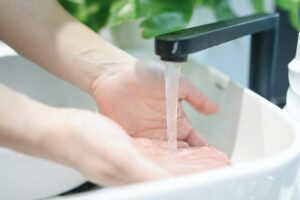
What can you do if you notice something is off with the water quality in your home? Fortunately, there are many products available that can help improve your home’s water quality. In this article, we’ll discuss common concerns and the solutions that can help you and your family enjoy better water quality in your home. Keep reading to learn more!
5 Common Water Quality Concerns
- Your water has a strange odor and/or taste. Maybe you turn on the tap and immediately get a whiff of metal, rotten eggs, or chlorine. Or perhaps you’d rather buy bottled water than drink water from your tap because of the unpleasant taste. If either of these concerns has you avoiding grabbing a glass of water from the faucet, then it’s time to look into water-quality products.
- Your hair and skin seem dried out all the time. If you’ve sunk a lot of money into moisturizing soaps, hair conditioner, and body lotion and nothing seems to help your dry hair and skin, chances are the problem is the water you’re bathing in. Chlorine and minerals like lime can dry out your skin and hair.
- You have buildup on your plumbing. People who have hard water often notice limescale buildup that can wreak all sorts of havoc with their plumbing. Not to mention, it can become costly, because limescale often shortens the lifespan of hot water heaters, and household appliances like coffee makers, washers, and dishwashers.
- Clothing and dishes are stained. If your white shirts, towels, and bedding are looking worse for wear, it could be your water. There are many minerals that can cause the staining of dishes, laundry, and sometimes even your hair and nails. Iron, sulfur, and manganese can all leave behind yellow or orange staining that’s practically impossible to remove – and that can get expensive.
- Your water looks dirty. Good-quality water should be clear, not cloudy. If your water looks cloudy, or you can see particles in it, chances are it’s contaminated. Many times, this contamination is caused by minerals but there can sometimes be bacterial concerns, especially if you have a well system.
I think I need water treatment. What are some of my options?
If you think the water in your home isn’t as clean and fresh as it should be, the next step you’ll want to take is getting a water quality analysis from a professional. That way, you’ll be able to learn what types of contaminants are present in your water, and what the best course of action is when it comes to water treatment. Below are some of the water treatment options available, and an explanation of how they work to improve your home’s water quality.
- UV Light System: UV water purification treatment is a different process than a typical water filter uses, although they’re often used in conjunction with one another. A water purification system using UV lights purifies water so that it’s up to 99.9 percent free of bacteria and viruses. Purifiers can also attack algae and fungi, inhibiting their development in your existing water system.
- Water Filtration System: A whole-house water filtration system adjusts your water, using reverse osmosis for demineralization. Reverse osmosis is one of the most effective water filtration methods. The quality, taste, and appearance of tap water are all things that can be affected by harmful contaminants. After a reverse osmosis water filtration system is installed, your faucets will provide you with clean, natural-looking water.
- Water Softener: A water softener works by eliminating the calcium or magnesium found in hard water. One of the more common types of water softeners is an ion-exchange water softener. The softener contains resin beads that soften the water and help to eliminate the calcium and magnesium in the water. The minerals cling to the beads, and the sodium scrubs the beads clean so they can continue to soften the water.
Count on Home Climates for the water treatment products and services you need.
Home Climates offers full-service plumbing, including water treatment products and services. We can help you get the better water quality you deserve for your home and family. Call us today at 717-689-4151 to learn more about our water treatment options and a representative will be able to help you right away.










